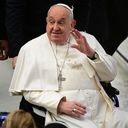Robinhood CEO Vlad Tenev calls prediction markets 'the future' and says the company will play a 'leading role'

Smith Collection/Gado/Gado via Getty Images
- Robinhood CEO says prediction markets are the "future of not just trading, but also information."
- Vlad Tenev said he wants Robinhood to play a 'leading role' in developing them.
- Prediction markets are bets on the outcome of a future event, like an election.
Robinhood CEO Vlad Tenev said his company is going all in on prediction markets, saying they're the "future."
Tenev discussed prediction markets and his financial services company during Friday's episode of "Hard Fork," a podcast produced by The New York Times. Tenev — who's worth over $3 billion — shared his opinion about how the prediction market differs from sports betting.
"I think that mechanically there's some similarities, but they're different things," Tenev said.
"First of all, I think prediction markets are the future of not just trading, but also information," he said. "I've been a big believer in the power of prediction markets for a long time — kind of a student of them — and I think prediction markets should be live for everything."
Prediction markets are essentially bets on the outcome of future events. Traders place bets based on what they believe will happen. If enough people participate, the collective input could be a strong indicator of what might actually happen.
Tenev compared prediction markets to traditional news models like newspapers and broadcast news.

Steve Granitz/FilmMagic
"People pay for broadcast news, too, indirectly in the form of advertising. So, what prediction markets are is the news faster, right?" Tenev said. "In some cases, you get it even before it happens. So, the economic value of that as a product and service should be at least as high, and I would argue strictly greater, than the news after it happens."
Robinhood had some success with its prediction market for the 2024 presidential election, which largely predicted Donald Trump would win though Kamala Harris made a late surge after an influential Iowa poll wrongly predicted the state would land in the Democrat's column. Prediction markets on various betting platforms — normally a realm for sports — exploded in popularity during the election.
Robinhood also launched Super Bowl event contracts earlier this month but stopped the rollout after a request from the US Commodity Futures Trading Commission.
"At the end of the day, I think what you'll see is prediction markets are here to stay," he said. "I think some of the details around what types of prediction markets are classified in what category I think will be worked out, but Robinhood will play a leading role in that because I think this is like incredibly important technology."
Tenev talked about the potential prediction markets have for Robinhood's business during its 2024 fourth-quarter earnings call this month.
"So we were one of the few platforms that offered the ability to trade the election and that was very successful for us," Tenev said. "We had over half a billion contracts traded in right around a week leading up to the election, and so what you should expect from us is a comprehensive events platform that will give access to prediction markets across a wide variety of contracts later this year."

